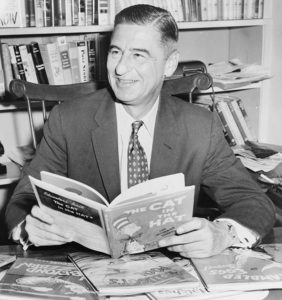 “Dad always says to me, / ‘Marco, keep your eyelids up / And see what you can see.’” This advice remains as good now as it was in 1937, when it appeared in Dr. Seuss’s first book, And to Think That I Saw It on Mulberry Street.
“Dad always says to me, / ‘Marco, keep your eyelids up / And see what you can see.’” This advice remains as good now as it was in 1937, when it appeared in Dr. Seuss’s first book, And to Think That I Saw It on Mulberry Street.
The story is a wonderful tale about the difference between imagination and facts. The young Marco sees “a plain horse and wagon on Mulberry Street,” but, wanting to make it more exciting, he soon envisions not a horse and cart but an elephant pulling along a brass band, with various other astonishing things and people along for the ride. The story celebrates a vibrant imagination but encourages the reader not to confuse reality with “outlandish tales.”
The story of the book’s publication 75 years ago is as insightful as the tale itself, as NPR recounts. After facing rejection by publishers 27 times, Theodor Geisel (Dr. Seuss) had nearly given up hope. But, while walking home, he ran into an old friend who happened to work as an editor at a publishing house. The editor saw a friend with a manuscript, but he envisioned the beginning of a publishing sensation. Dr. Seuss went on to bring his visions of the fantastic into publishing reality.
So, as the editor did when he imagined the possibilities in a stack of crinkled old papers, keep your eyelids up, and see what you can see. Then imagine all that you can accomplish with what you see and set out to realize your goals.
If you enjoyed this post, consider subscribing to The Objective Standard and making objective journalism a regular part of your life.
Related:
- The Power of Observation: From Art to Literature to Life
- Transfiguring the Novel: The Literary Revolution in Atlas Shrugged
Image: Wikimedia Commons


![[TEST] The Objective Standard](https://test.theobjectivestandard.com/wp-content/uploads/2017/10/logo.png)











